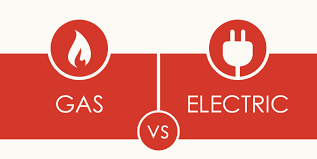Converting a gas appliance to an electric, or vice versa, involves several considerations and costs. Here's an overview of the process and potential costs:
Converting Gas Appliance to Electric:
Converting a gas appliance to an electric one can be more complex and costly due to the differences in energy sources and infrastructure requirements. Here are the general steps and potential costs:
Appliance Compatibility: Not all gas appliances can be easily converted to electric. Compatibility depends on the design and functionality of the appliance.
Replacement Appliance: If the conversion is feasible, you would need to purchase a new electric appliance. The cost varies based on the type and brand of the appliance. For example, converting a gas stove to an electric one might cost several hundred to over a thousand dollars.
Electrical Wiring: Electric appliances require proper electrical wiring and outlets. You might need to hire an electrician to install new wiring and outlets if they are not already in place.
Installation Costs: The installation cost depends on the complexity of the installation and the location of the appliance. Wiring, outlets, and potentially circuit upgrades are factors that contribute to the cost.
Converting Electric Appliance to Gas:
Converting an electric appliance to gas can also be challenging and costly due to the need for gas lines and venting. Here are the general steps and potential costs:
Appliance Compatibility: Not all electric appliances can be easily converted to gas. Compatibility and modifications depend on the appliance's design.
Gas Line Installation: You will need to have a gas line installed if one doesn't already exist in the area where you want to place the gas appliance. The cost of adding a gas line varies significantly based on the distance from the gas main, labor costs, and local regulations. It can range from several hundred to a few thousand dollars.
Appliance Conversion or Replacement: For appliances like stoves or ovens, you might need to convert or replace specific components (such as burners and valves) to accommodate gas use. This cost can vary based on the appliance and the complexity of the conversion.
Venting: Gas appliances often require proper venting to ensure the safe release of combustion byproducts. Venting requirements can impact the overall cost of the conversion.
Appliance Cost: Gas appliances might have higher upfront costs compared to their electric counterparts.
It's important to note that the costs mentioned above are estimates and can vary widely based on factors like your location, the specific appliances, labor costs, and any additional requirements. Before considering a conversion, consult with professionals, such as appliance technicians, electricians, and plumbers, to get accurate assessments and quotes for the specific work needed.
Adding a gas line can also have varying costs based on the factors mentioned earlier. It's recommended to obtain quotes from licensed plumbers who can assess the specific requirements of your home and provide you with a more accurate cost estimate.

